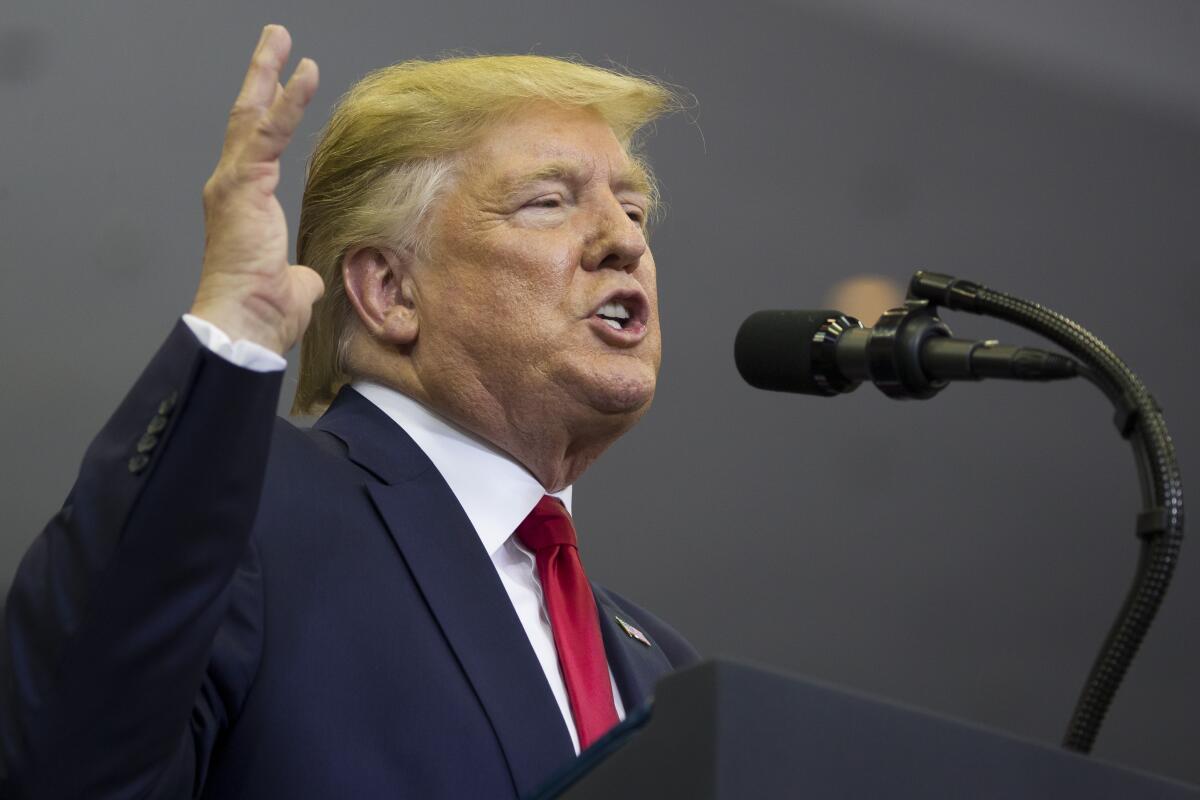Editorial: The media can’t just ignore Trump’s outrageous tweets. Here’s why

President Trump, for better or worse, could be the most unfiltered president in the nation’s history. His public comments often meander and crisscross and, within a span of seconds, contradict themselves. Then there’s his Twitter feed, a sandblaster through which he spews a torrent of insults, innuendo and outright lies attacking critics real and perceived; applauds and retweets the apple-polishers and sycophants who are the chorus in his verbal attacks; and positions himself in the eye of a hurricane of chaos. Scattered throughout like patches of grass in a diseased lawn are routine pronouncements about administration actions, the sort of topics that in halcyon days made up the bulk of White House communications.
Trump critics offended by the worst of the president’s utterances often ask why the media seem to find all of his lies and provocations newsworthy. Doesn’t that just give him what he wants? Isn’t the media getting played by “the great and terrible” Trump, to borrow an image from L. Frank Baum? Why not just ignore the “humbug” behind the curtain?
As tempting as that might be, the media can’t tune out Trump’s tsunami of tweets and his many utterances in other forums and still meet our fundamental responsibility to report on the news and try to hold government officials accountable for their actions. Trump’s attacks occasionally provide a glimpse of executive orders to come. And if the media simply shrugged whenever the president tweeted or said something outrageous, that would hasten the day when that sort of behavior seems normal.
Trump, to be sure, has broken the mold on presidential behavior (and not in a good way). He seems to conduct foreign policy by impulse, often bypassing the traditional diplomatic channels of his own government as he threatens acts of war or extends olive branches through Twitter. He has fired people in tweets, the presidential equivalent of dumping a girlfriend via text. His tweets, in other words, can break news.
Granted, he has also lied and goaded, trolled and rewarded in less obviously newsworthy ways. But in this era of unprecedented deception and manipulation from the White House and toxic partisanship just about everywhere else, it is all the more important that the media accurately report on the Trump administration, and Trump himself. How to do so is the question.
The work gets even more difficult as Trump and his supporters constantly try to make the media the issue instead of the president’s behavior, and as much of the public conflates talking heads on cable TV roundtables or opinion pieces in newspapers such as this one with news coverage. Add the lightspeed spread of everything, fact and fiction, on social media and the picture becomes even more confusing.
This information tower of Babel gives oxygen to this president. Trump rose to power in part by exploiting the cultural and social fractures that belie the notion that we are a nation of united states. The fabric of American society itself has long strained under growing income inequality, racial divisions and regional and cultural distrust.
So yes, the media has to cover the man behind the curtain. Not every tweet needs to be documented and analyzed, especially since so much of what the president says consists of intentional provocations rather than reliable indicators of purpose and policy. Yet enough of what the president says becomes policy or directive that his statements must be reported on. His anti-Muslim blasts during the campaign and the start of his presidency became an immigration ban. His jabs at China became a wall of tariffs. His ginned-up complaints about social media platforms censoring conservative voices became last week’s legally dubious executive order seeking to undermine a key protection for free speech on the internet — a chilling flex of presidential power.
In truth, the media could, and must, do a better job putting this particular president and his words in context. But it can’t just ignore them. The undeniable reality is that a president’s words matter, whether they are uttered in anger, to tarnish enemies or praise supporters, to sow dissent, or as an abuse of power.
More to Read
A cure for the common opinion
Get thought-provoking perspectives with our weekly newsletter.
You may occasionally receive promotional content from the Los Angeles Times.










